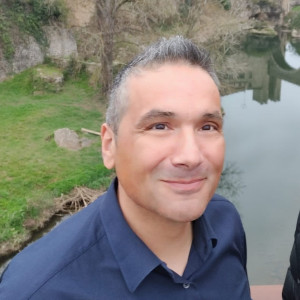
El verbo 'to have' en presente simple afirmativo
'To have' significa tener, haber o tomar.
Presente Simple afirmativo
| Forma larga | Forma corta |
|---|---|
| I have | I've |
| You have | You've |
| He has | He's |
| She has | She's |
| It has | It's |
| We have | We've |
| You have | You've |
| They have | They've |
Ejemplos
| I have a bicycle | Tengo una bicicleta |
| You've a car | Tienes un coche |
| He's a brother | Tiene un hermano |
| She has a shower | Toma una ducha |
| It has a reason | Hay una razón |
| We have breakfast | Tomamos el desayuno |
| You have the book | Tenéis el libro |
| They've money | Tienen dinero |
Negativo
Sujeto + have/has + not+....
Sujeto+ do/does + not+ have+....
Cuando se use el auxiliar éste debe concordar con el sujeto.
| Forma larga | Forma corta |
|---|---|
| I do not have | I don't have |
| You do not have | You don't have |
| He does not have | He doesn't have |
| She does not have | She doesn't have |
| It does not have | It doesn't have |
| We do not have | We don't have |
| You do not have | You don't have |
| They do not have | They don't have |
Ejemplos
| I don't have money | No tengo dinero |
| You do not have any sisters | No tienes hermanas |
| He doesn't have any time for me | No tiene tiempo para mi |
| She does not have any friends | No tiene amigos |
| It doesn't have chocolate in it | No tiene chocolate |
| We do not have motorbikes | No tenemos motos |
| You don't have pets | No tenéis mascotas |
| They don't have dresses | No tienen vestidos |
Interrogativo
Have/Has + sujeto + ... ?
Do/does + sujeto + verbo +... ?
| Do I have...? |
| Do you have...? |
| Does he have...? |
| Does she have...? |
| Does it have...? |
| Do we have...? |
| Do you have...? |
| Do they have ...? |
Ejemplos
| Do I have a brother? | ¿Tengo un hermano? |
| Where do you have your car? | ¿Dónde tienes tu coche? |
| Does he have a cousin? | ¿Tiene una prima? |
| Does she have a boyfriend? | ¿Tiene novio? |
| Does it have a future? | ¿Tiene futuro? |
| Don't we have another chance? | ¿No tenemos otra oportunidad? |
| Do you have children? | ¿Tenéis hijos? |
| When do they have a party? | ¿Cuándo tienen una fiesta? |
Si se usa un pronombre interrogativo éste se colocará al comienzo de la oración.
Ejercicios
1 Completa las siguientes oraciones con la forma larga del verbo to have en presente simple afirmativo.
She a nice dress.
Este campo es obligatorio.
has
They a new car.
Este campo es obligatorio.
have
My house a nice garden.
Este campo es obligatorio.
has
We a cold.
Este campo es obligatorio.
have
You a camera.
Este campo es obligatorio.
have
Completa las siguientes oraciones con la forma corta del verbo to have en presente simple afirmativo.
He got a new house.
Este campo es obligatorio.
He's got a new house.
I got two brothers.
Este campo es obligatorio.
I've got two brothers.
She got a long blond hair.
Este campo es obligatorio.
She's got a long blond hair.
We got a big dog.
Este campo es obligatorio.
We've got a big dog.
They got a black case.
Este campo es obligatorio.
They've got a black case.
¿Buscas un curso de ingles? Superprof es tu sitio.
Resumir con IA:













En el verbo to be no aplica
Hola Camila,
Tienes razon, el verbo to be es una excepción. No usa do/does para hacer preguntas. Por ejemplo, decimos Are you…? en lugar de Do you be…?.»
En este artículo nos estamos enfocando en «to have» por lo que al ser have, formulamos de esta manera las preguntas.
Saludos!
a) She _is__ (be) very tall and _has__ (have) blue eyes.
b) We _are__ (be) in the classroom now.
c) They _have__ (have) a big house in New York.
d) I _am__ (be) a teacher and I _have__ (have) a lot of students.
e) You have___ (have) a brother, right?
Se utiliza el have para la complementación del ejércisio
¡Hola Alizze!
Aquí estamos ejercitando el uso del verbo «to have» en oraciones interrogativas que es de uso diario en inglés. Que como dice el ejercicio, se formula de esta forma: «Do/does + sujeto + verbo +… ?» en donde do/does es nuestro verbo auxiliar y have nuestro verbo principal.
espero esto te ayude!
Quince oraciones afirmativas en inglés